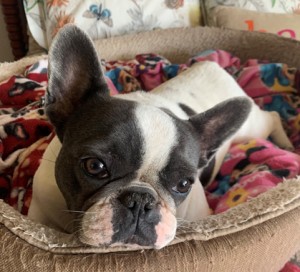UC Davis: Surgery and Chemotherapy Utilized to Avoid Amputation of Dog’s Paw
 When Violet, 2-year-old female French bulldog, was rescued by Alyssa Sterns, she had already been through more health problems than any young dog should. Overbred by a breeder, Violet developed hip dysplasia and had undergone surgery on both hips. Now, she developed a mast cell tumor on the paw of her left hind limb. Violet’s veterinarian informed Sterns that the tumor would be difficult to remove without amputating the paw, which was not ideal given her hip problems. So, Sterns took Violet to the UC Davis veterinary hospital for a second opinion.
When Violet, 2-year-old female French bulldog, was rescued by Alyssa Sterns, she had already been through more health problems than any young dog should. Overbred by a breeder, Violet developed hip dysplasia and had undergone surgery on both hips. Now, she developed a mast cell tumor on the paw of her left hind limb. Violet’s veterinarian informed Sterns that the tumor would be difficult to remove without amputating the paw, which was not ideal given her hip problems. So, Sterns took Violet to the UC Davis veterinary hospital for a second opinion.
At UC Davis, veterinary oncologists and soft tissue surgeons collaborated to devise a plan to avoid complete amputation of the paw. While they agreed that the tumor was in a precarious position in relation to Violet’s toes, they felt they could remove the tumor and only remove digits three and four. This strategy would result in a marginal excision, however, meaning that microscopic tumor cells may be left behind. If in the future the mast cell tumor recurs and spread to the other toes, more aggressive procedure such as amputation of her left back leg would be recommended.
Because Violet’s lymph node was confirmed to contain metastasis (spread of disease), her veterinary care team also recommended removing the lymph node at the time of surgery. Sterns agreed, and Violet’s surgery went as planned. Surgeons removed the tumor and only the middle two digits on her left hind paw, and the lymph node was removed.
Violet underwent several rounds of follow-up chemotherapy to try to slow down any further growth and/or spread of the disease.
From the beginning of the process, financial concerns weighed heavily on Sterns.
“We were able to get her through two hip surgeries on our own, but when we found out that Violet had a tumor on her back paw, we were devastated,” said Sterns. “We could not afford the veterinary bills to get Violet the treatment she needed, and after all that she had been through, we were terrified she would not make it.”
Thankfully, Sterns qualified for financial assistance through a generous grant from the Blue Buffalo Foundation’s support of the Petco Foundation pet cancer treatment program at the UC Davis veterinary hospital. The grant helps support treatments for domestic companion animals suffering from cancer. The project is designed to support pet parents of modest means or pet parents whose pets provide a service to others.
“Violet got through her surgery successfully and had several rounds of chemotherapy – all covered by this generous fund,” said Sterns. “Violet is not only alive, but she is thriving. We are forever thankful to UC Davis and the Petco fund.”
Short URL: http://caninechronicle.com/?p=186193
Comments are closed












